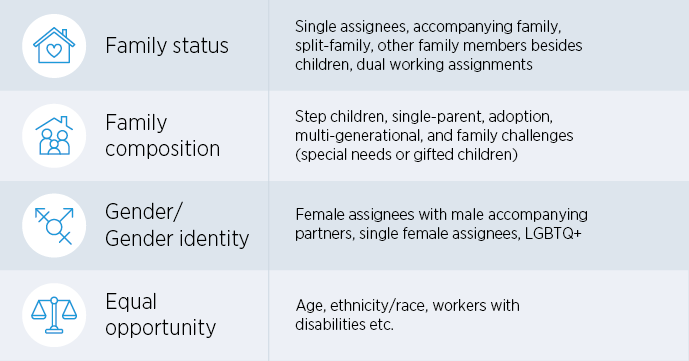The pandemic represents a rare but narrow window of opportunity to reflect, reimagine, and reset our world.
”
As we begin to take tentative steps out of the pandemic, one of the ways in which life feels like it has changed is that there has been a real moment of pause and reflection. With two-thirds of businesses planning to increase their diversity and inclusion activities, many global mobility (GM) departments are now looking to take stock of their policies; not only to consider whether they are still fit for purpose, but also how they are to look in the new post-Covid workplace.
Such thoughts were echoed during our Global Mobility Exchanges, a series of virtual discussion sessions we hosted over the last few months, with one client noting: “we are using the momentum of the pandemic to see if we can push things in a new direction.”
It has long been established that mobility is critical to leadership pathways. Therefore, to support broader company DE&I initiatives, global mobility must be proactive in ensuring that everyone has equal access to opportunities; this means careful reflection on the changing composition of the overall workforce and how GM can better support employees with diverse needs.
During our Exchange sessions, we discussed ways in which GM teams might find opportunities within the typical assignment lifecycle to go about embedding inclusion, and better supporting the groups below. This blog will outline some key insights raised during these discussions, and how GM teams should begin to review these populations with the target of championing diversity.

You could argue that the assignment lifecycle begins before the assignee sets foot in their host country, and even from the moment they consider accepting an assignment or a future where they might be globally mobile. In order to make their GM programmes more inclusive, managers should consider whether the assignment benefits and overall compensation package offered truly represent equity, whilst also reflecting and supporting the needs and wellbeing of a broader candidate pool.
During the Exchanges, we heard of some companies that have introduced single parent allowances, and others who have sought ways to support assignees who may be leaving their children with an ex-partner in the home country, enabling them to make more frequent trips home. Similarly, other companies were seeing a rise in unaccompanied assignments, where families do not move with the assignee. Reasons for this were frequently cited as the partner preferring to stay at home to pursue their own career, and to avoid disruption of schooling for children.
The topic of eldercare, while not commonly offered as an employee benefit to date – with only 3% of companies providing support in our recent benchmarking survey – is certainly an area of interest for employers and they see this as a good way to introduce more DE&I initiatives into their assignment programmes. It was noted that for some companies, assignees are also asking for their medical insurance to cover their parents. Equally, for serial assignees who may return to their home country infrequently, these groups tend to be more worried about their family and needing the support and reassurance that eldercare could provide.
On the other side of the spectrum, more assignees are now asking about childcare benefits on assignment, particularly provision for pre-school children. For the GM Exchange with mobility professionals in France, this was particularly popular given the generous state provision available. Employers are being forced to address this and consider what they can offer in the host country as many of these are younger assignees with small children, and both parents are working. Failure to provide benefits based on the needs of the assignee could discourage this population from taking up assignments in the first place. Our recent Benefits for International Assignments Survey identified only 22% of respondents giving assistance with childcare for children below mandatory school age in the host country.
There can be no doubt that the pandemic has brought about a new requirement for GM teams to work more flexibly, listening to the needs of the assignee and their family. More requests appear to be employee driven now and there is a focus on transparency.
Clearly any adaptation of a GM programme to promote DE&I must begin with the careful and considered review of existing policies as well as the opportunity to seek input from employees in this regard. Through this route GM teams can become more proactive and less reactive in responding to their employees.
This fresh need to get everyone included in the conversation around inclusion to drive engagement and create a sense of belonging has been raised as important amongst those we spoke to, and here at ECA we can support you with this process. We see new approaches to employee mobility evolving as many companies move away from a one policy fits all approach to more inclusive policies which offer greater flexibility to cater for all assignees and their families’ needs.
FIND OUT MORE
Our Consultancy & Advisory team can prepare surveys and offer workshops to support engagement and help find solutions to address any gaps in DE&I. Our consultants also work with clients to benchmark and review GM benefit packages, optimising them to promote greater inclusivity.
ECA also provides information and reports on important topics such as education and country profiles for your HR teams and assignees.
Please contact us to speak to a member of our team directly.